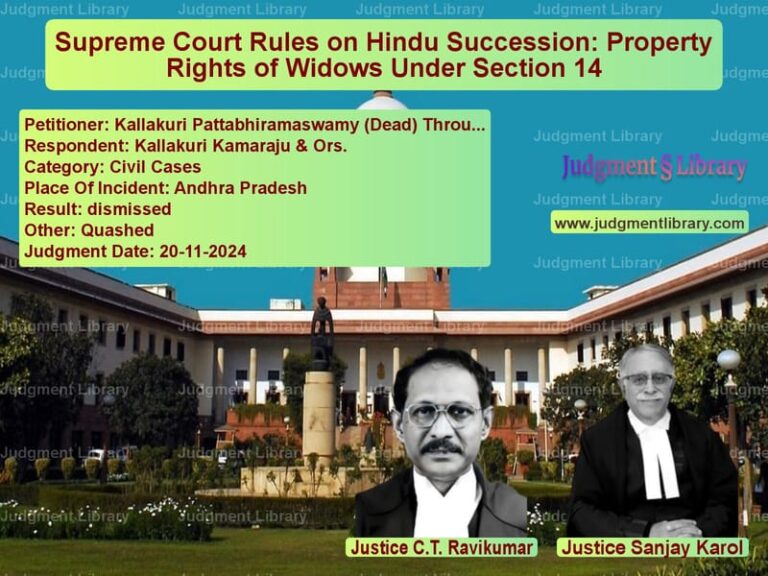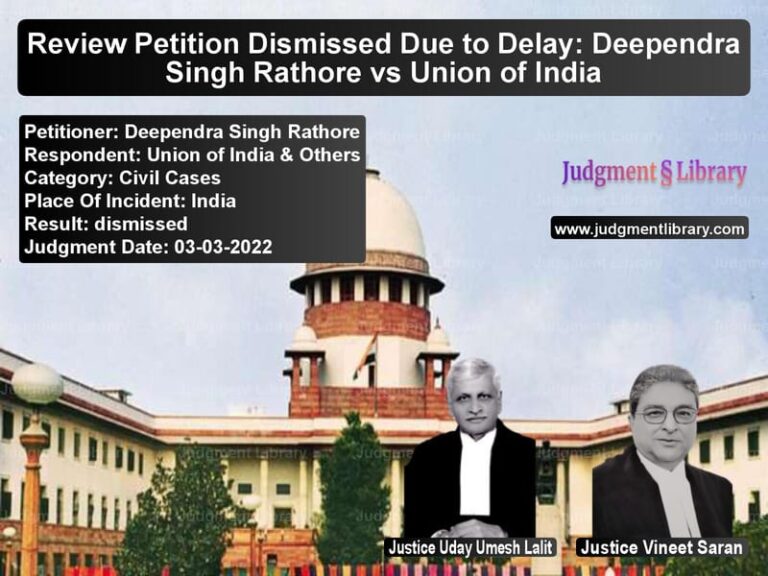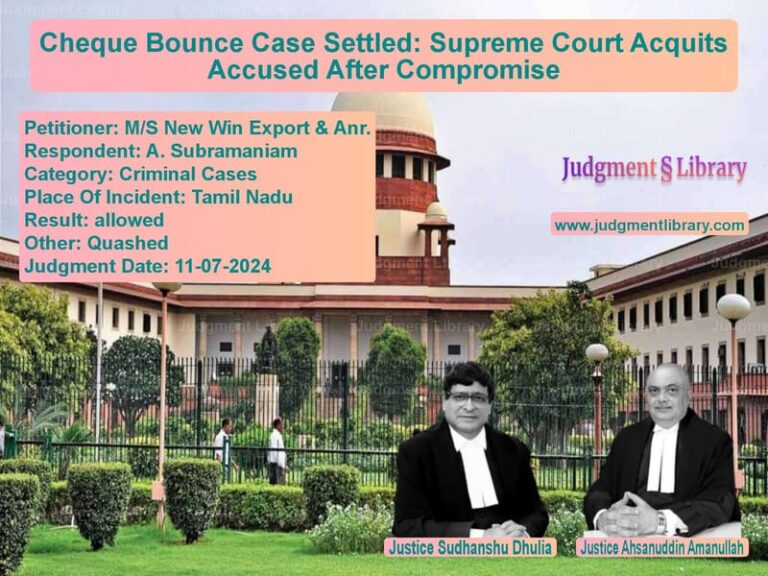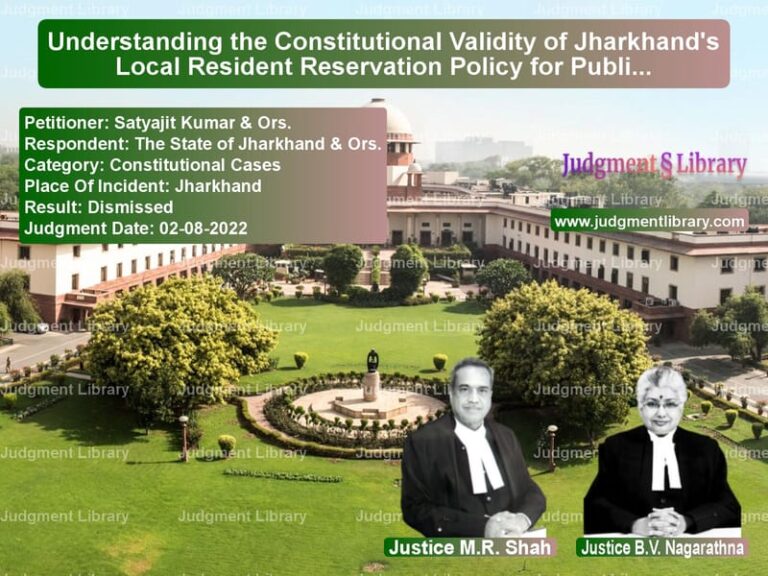Taxable Turnover and Trade Discounts: Supreme Court Clarifies Deduction Rules
The Supreme Court of India, in its recent judgment in M/s Maya Appliances (P) Ltd. v. Addl. Commissioner of Commercial Taxes & Ors., addressed the issue of whether quantity-based trade discounts offered by a dealer to its distributors should be included in the computation of taxable turnover under the Karnataka Value Added Tax Act, 2003. The Court overturned the Karnataka High Court’s decision and held that trade discounts should be deducted from the total turnover when computing VAT liability, provided the discounts are an established business practice and reflected in the company’s financial records.
Background of the Case
The appellant, M/s Maya Appliances (P) Ltd., now known as Preethi Kitchen Appliances Pvt. Ltd., is a manufacturer of home appliances such as mixer grinders, wet grinders, and gas stoves. As a part of its sales strategy, the company granted two types of discounts to its distributors:
- Scheme Discounts – Offered on a periodic basis as an incentive.
- Quantity Discounts – Provided based on the volume of purchases made in a given period.
These discounts were deducted from the total sale price, and VAT was levied on the net amount. However, the Deputy Commissioner of Commercial Taxes, Bengaluru, in an order dated May 29, 2010, disallowed the deduction for quantity discounts, stating that these were not directly linked to the sales invoices and therefore not eligible for deduction under Rule 3(2)(c) of the Karnataka Value Added Tax Rules, 2005.
Chronology of Legal Proceedings
- The appellant challenged the disallowance before the Joint Commissioner of Commercial Taxes (Appeals – 1), Bengaluru, who ruled in favor of the appellant, holding that VAT was correctly charged on the net amount after allowing discounts.
- The Additional Commissioner of Commercial Taxes, under Section 64(1) of the Karnataka VAT Act, revised this order, holding that quantity discounts related to the previous quarter’s performance and could not be deducted.
- The appellant filed Sales Tax Appeals before the Karnataka High Court, which dismissed the appeals on March 19, 2014, upholding the disallowance.
- Aggrieved by the High Court’s ruling, the appellant approached the Supreme Court.
Key Legal Issues
- Whether trade discounts granted for previous quarters should be deducted from the total turnover while computing VAT liability.
- Whether Rule 3(2)(c) of the Karnataka VAT Rules mandates that discounts must be mentioned in the same sales invoice to qualify for deduction.
- The interpretation of “turnover” and “taxable turnover” under the Karnataka VAT Act.
Arguments Presented
Petitioner (M/s Maya Appliances Pvt. Ltd.)
The appellant argued:
- The trade discounts were an integral part of business transactions and should not be included in the taxable turnover.
- VAT was already collected and paid on the net sale price after deducting discounts, as reflected in the financial statements.
- The discounts were known at the time of sale, though quantified later, and formed part of an established business practice.
- The Karnataka High Court’s interpretation of Rule 3(2)(c) was too restrictive and contrary to established legal precedents.
Respondents (State of Karnataka & Tax Authorities)
The respondents countered:
- Rule 3(2)(c) allows deductions only for discounts explicitly mentioned in the sales invoice.
- Since the discounts were linked to past sales performance and not given at the time of issuing the invoice, they should not be deducted from the turnover.
- The taxable turnover must include all amounts received by the dealer unless explicitly exempted by law.
Supreme Court’s Analysis
1. Definition of Turnover and Taxable Turnover
The Supreme Court examined Section 2(36) of the Karnataka VAT Act, which defines “turnover” as the aggregate amount for which goods are sold. Section 2(34) defines “taxable turnover” as the turnover after allowing permissible deductions.
2. Interpretation of Rule 3(2)(c)
Rule 3(2)(c) allows deductions for discounts if they are:
- Part of a regular trade practice.
- Given under a contract or agreement.
- Mentioned in the sales invoice.
The Supreme Court noted that while the rule requires discounts to be in the invoice, this should not be interpreted rigidly. Instead, the intent of the rule must be considered.
3. Previous Legal Precedents
The Court relied on its earlier judgment in Southern Motors v. State of Karnataka (2017), which held that trade discounts should not be disallowed simply because they were not included in the original invoice. The Court observed:
“Trade discounts, if given as per established practice and recorded in accounts, must be deducted from the total turnover.”
4. Final Ruling
The Supreme Court ruled that:
- Trade discounts granted for previous quarters should be deducted from the taxable turnover.
- Rule 3(2)(c) should not be interpreted in a way that leads to an undue tax burden on dealers.
- The Karnataka High Court’s ruling was incorrect and needed to be set aside.
- The appeal was allowed, and the appellant was entitled to a refund of excess VAT paid.
Implications of the Judgment
- Clarification on Trade Discounts: The judgment confirms that discounts linked to past sales can be deducted if they are part of the company’s regular trade practice.
- Prevention of Unfair Taxation: The ruling prevents businesses from being taxed on amounts they do not actually receive.
- Legal Precedent for Future Cases: The decision reinforces the principle that VAT should be levied on the actual sale price rather than arbitrary calculations.
- Taxpayer-Friendly Interpretation: The judgment provides relief to businesses by ensuring that discounts are treated fairly under VAT laws.
Conclusion
The Supreme Court’s decision in M/s Maya Appliances (P) Ltd. v. Addl. Commissioner of Commercial Taxes & Ors. is a landmark ruling in VAT law. By allowing deductions for trade discounts offered after the invoice date, the Court has ensured that businesses are not unfairly taxed. This judgment will serve as a guiding precedent for future tax disputes and provide much-needed clarity on the issue of taxable turnover.
Petitioner Name: M/s Maya Appliances (P) Ltd.Respondent Name: Addl. Commissioner of Commercial Taxes & Ors.Judgment By: Justice Dipak Misra, Justice A.M. Khanwilkar, Justice D.Y. ChandrachudJudgment Date: 06-02-2018
Don’t miss out on the full details! Download the complete judgment in PDF format below and gain valuable insights instantly!
Download Judgment: Ms Maya Appliances vs Addl. Commissioner o Supreme Court of India Judgment Dated 06-02-2018.pdf
Direct Downlaod Judgment: Direct downlaod this Judgment
See all petitions in Income Tax Disputes
See all petitions in GST Law
See all petitions in Tax Refund Disputes
See all petitions in Judgment by Dipak Misra
See all petitions in Judgment by A M Khanwilkar
See all petitions in Judgment by Dhananjaya Y Chandrachud
See all petitions in allowed
See all petitions in Quashed
See all petitions in supreme court of India judgments February 2018
See all petitions in 2018 judgments
See all posts in Taxation and Financial Cases Category
See all allowed petitions in Taxation and Financial Cases Category
See all Dismissed petitions in Taxation and Financial Cases Category
See all partially allowed petitions in Taxation and Financial Cases Category







